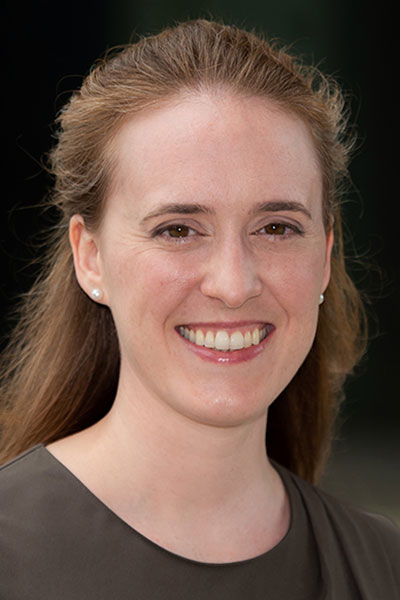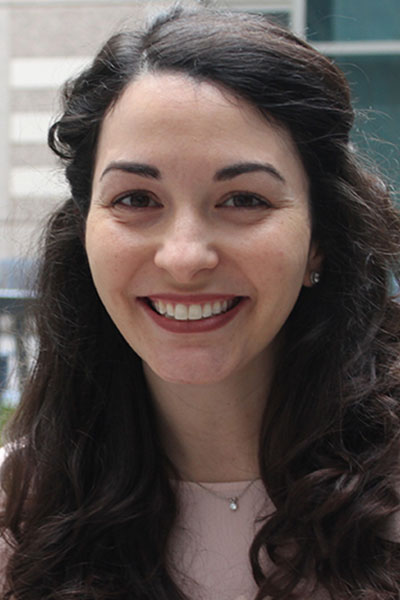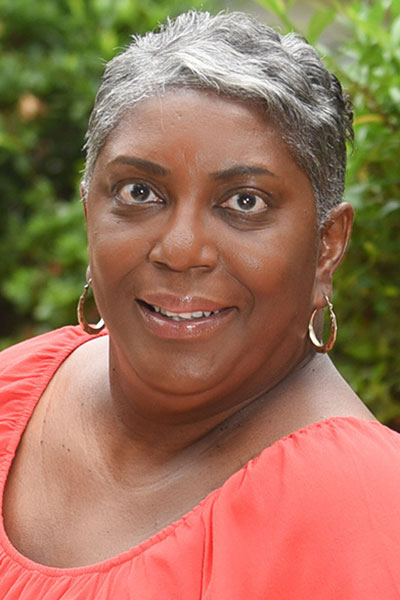LIVING WITH METASTATIC BREAST CANCER
Tuesday, December 6 • 10:00 am – 12:00 pm CT • Stars at Night Ballroom 3&4

Presentation: Early palliative care
Tara L. Kaufmann, MD, MSCE
Assistant Professor, Department of Oncology
Dell Medical School, The University of Texas at Austin
What is your presentation about?
I will be discussing early palliative care for patients with metastatic breast cancer (MBC). Early palliative care provides many benefits to patients and their families during cancer treatment to relieve suffering from the disease itself and side effects of treatment. However, early palliative care is still not well integrated into oncology care in both academic and community settings. How we should best deliver palliative care for patients with breast cancer is still an active area of investigation. This presentation provides an overview of the field of research in early palliative care for patients with advanced solid tumors and discusses considerations specific to breast cancer. I will present current challenges that we face in integrating palliative care into our practice and future areas for clinical innovation and research in palliative care. I will present practical tips for how we, as breast oncologists, can start to better deliver early palliative care for our patients.
What makes this topic important in 2022?
Now more than ever in 2022, there is a focus on how to deliver the highest quality and equitable care to our patients with cancer. Palliative care is part of the solution to providing patient-centered, high-quality care. It improves quality of life, symptoms, and even has a survival benefit in some populations. However, it remains unknown how to best deliver palliative care to patients with breast cancer.
To solve this challenge in breast cancer, we need to figure out how to deliver the right “palliative touch” at the right time to patients. It’s time to understand how we can develop models of care that better integrate palliative care for patients with breast cancer in an efficient, scalable, and equitable manner.
How/why did you become involved with this area of breast cancer research or care?
When I entered medical school, I became interested in oncology because of the relationship an oncologist develops with patients and families during cancer treatment. I was drawn to helping patients and families make decisions regarding complex, aggressive treatments that are concordant with goals of care. I was introduced to taking care of breast cancer patients in residency by Dr. Hyman Muss at UNC. He modeled how a breast oncologist can best deliver patient-centered, palliative breast cancer treatment and inspired me to enter the field of breast oncology. In fellowship my mentors and role-models, Dr. Angela DeMichele and Dr. Arif Kamal, were integral in supporting my continued involvement in breast oncology and palliative care, respectively.
Presentation: Support for patients with MBC

Abbey Kaler, MS, APRN, FNP-C
Nurse Practitioner in the Department of Breast Medical Oncology
Nurse Practitioner Navigator, Advanced Breast Cancer Program
The University of Texas MD Anderson Cancer Center
What is your presentation about?
The diagnosis of MBC is life-changing and requires individualized and multidisciplinary support. The NCI defined the areas of epidemiology and surveillance, symptom management, psychosocial research, health care delivery, and health behaviors as necessary fields to advance the state of the science in advanced cancer survivors. A multifaceted program addressing these domains is needed to assess MBC patients and their unique and ever-changing needs. With input from patients and providers, program components should include therapeutic clinical trials, multidisciplinary specialty care, individualized patient navigation, peer support, continuing education, and patient-reported outcome (PRO) collection to support patients living with MBC. Input for a program for MBC patients can be guided by a multidisciplinary steering committee in which patient advocates are a major voice. Patients can provide insight into what works for them, as what they are facing may be very different from the experience of an early-stage breast cancer patient.
What makes this topic important in 2022?
Over the last decade we have witnessed rapid advances in the treatment of patients with metastatic breast cancer with seminal discoveries in cancer biology, correlative biomarkers, and clinical trials leading to multiple new drug approvals. While these milestones have improved survival, the science of survivorship in this population is just beginning.
How/why did you become involved with this area of breast cancer research or care?
As a cancer survivor myself, I have always felt a calling to work with oncology patients. With my background in nursing, patient support is part of who I am. The Advanced Breast Cancer (ABC) Program patient advocates provide unique insight into their needs and the necessity of a multifaceted program to support all patients living with ABC. Their dedication and drive to creating a program to support themselves, as well as all patients, is truly inspiring. My continued commitment to building a world-renowned program is drawn from the patients’ enthusiasm and passion.
Co-Presentation: Patient Perspective
Christine Hodgdon
Co-founder of GRASP (Guiding Researchers and Advocates to Scientific Partnerships)

Stephanie Walker, RN
Project Director, Metastatic Breast Cancer Alliance
What is your presentation about?
Christine: Our presentation will examine the various pain points that exist throughout the cancer care continuum for patients living with metastatic breast cancer (MBC) from diagnosis, to treatment, to survivorship and even in the event of a patient’s passing, leaving a legacy. We will highlight patient advocates that are either living with MBC or are advocating on behalf of those with MBC to address these areas of concern.
What makes this topic important in 2022?
Christine: This is an important topic because it shows the power of patient advocacy and what people who have been affected by cancer can do, for example, to:
- Close the gap of health disparities and racial inequities
- Improve access to clinical trials
- Improve quality of life so that patients with MBC can live longer and better
- Increase education and support for patients
- Increase MBC research

Stephanie: Our presentation is geared to advocates, including patients and caregivers, looking for resources and inspiration, and to cancer scientists, including clinicians and researchers, interested in learning about the value of the patient and how they can improve their work and research, and how we must all work together to ensure access to equal and quality health care for patients with breast cancer/MBC.
How/why did you become involved with this area of breast cancer research or care?
Christine: Both Stephanie and I were diagnosed with MBC in 2015. As for myself, I saw major gaps in health care and support for patients living with MBC. By training, I am a conservation biologist, and I am very interested in the science behind breast cancer. I started my advocacy work in 2017 when I launched my website TheStormRiders.org which hosts a clinical trial database developed using a unique search algorithm I created. I later co-founded the program GRASP – Guiding Researchers & Advocates to Scientific Partnerships, to empower patients to inform the research process and drive more meaningful research that improves survival outcomes for breast cancer patients. I’m involved in several other initiatives that all have the same theme of bringing patients together with scientists (researchers and clinicians) to advance research and outcomes for people living with MBC.
Stephanie: I got interested in the research of MBC when I kept getting asked to answer the question of “why aren’t Blacks answering questions about research and clinical trials?” I was inspired by the late Marina Kaplan to finish her work regarding clinical trials and Black men and women with MBC. A world of implicit biases and institutional bias crept into how we aren’t included in clinical trials and yet the medications are given to us with some failures. I want to help increase clinical trial numbers for people of color. This is not just important in 2022, but must be ongoing as we move forward since we missed the earlier boat on this.

